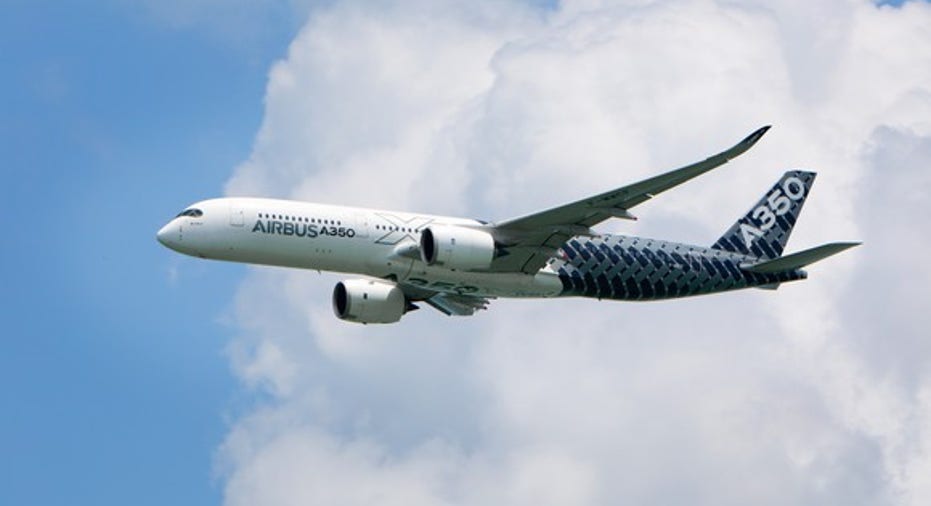Boeing's 777X Finally Breaks Its Order Drought With Singapore Airlines Deal

Boeing (NYSE: BA) launched the next-generation 777X with great fanfare in late 2013. The airplane held the promise of driving the next wave of growth in long-haul air travel while also replacing fuel-guzzling jumbo jets like the Boeing 747 and Airbus (NASDAQOTH: EADSY) A380 and serving as a successor to the popular 777-300ER.
Unfortunately, a combination of lower fuel prices and economic weakness in multiple regions of the world have undermined sales of the 777X. However, Boeing finally got a much-needed order last week, as Singapore Airlines agreed to take 20 of the larger 777-9 model.
The 777X falls into a rut
The 777X launched in November 2013 with 259 orders and commitments from four of the biggest international airlines: Emirates, Lufthansa, Qatar Airways, and Etihad Airways. Boeing said that this was a record number of commitments for a widebody aircraft at launch. The following month, Boeing received another 21 orders, this time from Cathay Pacific.
Since then, sales have slowed to a crawl. Japan's All Nippon Airways ordered 20 777-9s in 2014, but Boeing hasn't officially announced any significant new customers since then. In fact, Boeing didn't sell a single 777X during 2016.
After a strong start, Boeing 777X sales dried up after 2014. Image source: Boeing.
As a result, Boeing's firm order backlog for the 777X totaled 306 planes as of last month, barely more than the 2014 year-end total. This doesn't include the 15 777-9s that Iran Air officially plans to buy, because heightened tensions between the U.S. and Iran make it quite possible that this order will fall through.
The first 777X isn't scheduled for delivery until 2020, so getting more orders hasn't been an urgent priority. Still, while 306 orders seems like a sizable backlog, some of those orders stretch out as far as 2030. There are open slots at least as early as 2021. Boeing would obviously like to fill those slots well before the situation becomes critical two or three years from now.
A new order, at long last
Boeing finally broke its 777X order slump last week. On Thursday, Singapore Airlines announced plans to buy 20 777-9 aircraft, along with an additional 19 787-10 Dreamliners.
Winning this order was significant for two reasons. First, Singapore Airlines is a very prestigious carrier, and its aircraft orders can influence other airlines' fleet decisions. Indeed, with the Singapore Airlines deal, Boeing has now sold the 777X to each of the six best airlines in the world, according to the Skytrax 2016 World Airline Awards.
Second, Singapore Airlines' decision to order the 777X is a blow to Airbus' two competing aircraft programs: the A350 and A380. Singapore Airlines is the second-largest customer for both of those aircraft types, with 67 total orders for the A350 and 24 for the A380. It would have been easy for it to stick with those Airbus models if they were a match for the 777X.
Singapore Airlines chose the 777X over ordering more A350s. Image source: Airbus.
Instead, the 777X order is just one more sign that Singapore Airlines wants to reduce its reliance on the A380 jumbo jet or get rid of it entirely. It also helps undermine the case for a stretched version of the Airbus A350 that would compete directly with the 777-9. The market for planes of this size isn't that big, so every order won by Boeing erodes the business case for Airbus.
Time to sell more planes
Singapore Airlines has said that it will receive its first 777-9s during the 2021-2022 financial year. This will start to fill in some of the gaps in Boeing's firm order book for the 777X.
Still, 20 planes is a relatively small number, considering that the 777 production line currently churns out seven airplanes per month (down from 8.3 per month for the last few years). Thus, Boeing needs to keep working hard to bring in new customers for the 777X program in the face of weak demand for widebody jets.
Qantas and Turkish Airlines have both expressed interest in the 777X. Boeing should also try to sell the model to at least one of the major aircraft leasing firms, in order to make it available to smaller airlines. China's three big state-owned airlines (China Southern, China Eastern, and Air China) are obvious targets for a 777X sales campaign as well. Boeing can't rest on its laurels. It needs to use the Singapore Airlines deal as a springboard for further orders.
10 stocks we like better than BoeingWhen investing geniuses David and Tom Gardner have a stock tip, it can pay to listen. After all, the newsletter they have run for over a decade, Motley Fool Stock Advisor, has tripled the market.*
David and Tom just revealed what they believe are the 10 best stocks for investors to buy right now... and Boeing wasn't one of them! That's right -- they think these 10 stocks are even better buys.
Click here to learn about these picks!
*Stock Advisor returns as of February 6, 2017
Adam Levine-Weinberg owns shares of Boeing. The Motley Fool has no position in any of the stocks mentioned. The Motley Fool has a disclosure policy.



















